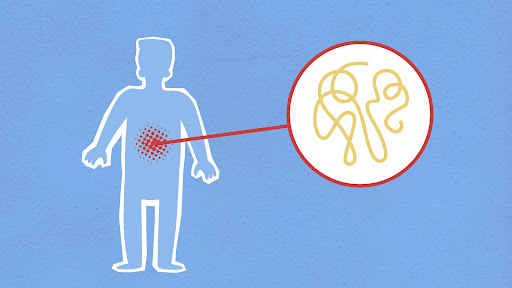
Inflammation has become something of a scary word these days, but not without reason. Having acute inflammation in your body is often the precursor to a variety of rather serious health concerns. Of course, it’s one thing to simply say that inflation is bad. But how do you know if you’re suffering from it?
Obviously, the first stop for any of your health concerns should be a medical practitioner. But if you’re wondering how to tell if you have inflammation, we’ll discuss some of the best ways to tell here. Often, customers are interested in our 21 day cleanse to deal with inflammation issues, so it makes sense that we’d try and help you ID the condition!
What is inflammation?
Most of us generally understand what inflammation is as a concept. If we’ve been injured, we’ve often seen injuries become red and aggravated. But that’s just the outside story. Inside our body, we can often suffer from unseen inflammation, affecting important organs and systems.
Technically, inflammation is a good thing—it’s a sign your immune system is reacting to an issue. But as anyone who has had a fever can tell you, your immune system is often prone to overreacting. In some cases, your immune system could even be reacting where there’s no real issue.
Often inflammation is divided into two types, acute and chronic. This is just a division based on severity. Acute inflammation should clear up within two weeks or so, and is generally linked to a specific injury or illness. Chronic inflammation sticks around longer, and isn’t often linked to a single issue, being more an indicator of poor health and stress.
Detecting inflammation
Identifying inflammation outside the body is easy—you just look for visible swelling and redness. If you have chronic inflammation inside your body, it might be less obvious that inflammation is the source of your problem. This is further complicated by the fact that not all inflammation is the same.
Chronic inflammation can be caused by a variety of conditions (including some severe medical conditions), and can crop up nearly anywhere in your body. Naturally, you can expect that inflammation in your brain will have a different effect than inflammation in your bowels. Following is a list of some of the more common symptoms of an inflammatory problem.
Body pain
This is by far one of the most common symptoms of inflammation out there. A whole array of nasty types of pain can come with inflammation. From throbbing to pinching, if you have chronic pain in your body, but can’t link it to a specific injury or illness, it could be a sign of chronic inflammation.
Brain fog
“Brain fog” refers to a condition where you suffer from chronic confusion, memory loss, and lack of focus. We increasingly realize that brain fog, rather than just being a sign of exhaustion or aging, can be linked to a variety of conditions—think about all the concerns over the connections between COVID-19 and brain fog. Turns out that inflammation could be a potential cause of brain fog as well.
Depression and anxiety
It’s not just general “brain fog” that’s associated with inflammation. There have been studies linking inflammation to more severe mood disorders. Of course, this gets into a bit of a complex topic. If you’re living an unhealthy lifestyle, depression and inflammation might arise independently. That’s all the more reason to stay active and maintain a healthy diet and eating habits!
Dizziness
While not a common symptom of inflammation, there have been cases recorded where inflammation of nerves or inner ear leads to dizziness. In some cases, this can be so severe it affects balance.
Fatigue and insomnia
If you have difficulty sleeping, it could potentially be connected to fatigue caused by inflammation. Of course, as with some of the other symptoms, fatigue is a common result from many health issues relating to blood sugar levels or being overweight. It’s likely if you have some of these problems, you could have bodily inflammation as well.
Gastrointestinal issues
When it comes to inflammation in your guts, there’s no good ending here. Acid reflux, constipation, and diarrhea are all the result of chronic inflammation affecting your intestinal systems. This is one of the types of inflammation-related illnesses that we tend to hear about the most at Chef V. There’s a reason our 21-day cleanse is so popular!

Heart troubles
One of the most frightening symptoms of inflammation is the emergence of heart issues. This could be because of inflammation in important arteries or because of inflammation in the heart itself. This inflammation can manifest in coronary diseases or even heart failure.
Insulin issues
For many people, getting control of their blood sugar levels is difficult enough as is. And that’s before you throw in the complications of insulin resistance. Our bodies need insulin to help manage blood sugar levels. Inflammation, however, has been connected with triggering insulin production in your body to the point that your systems become resistant. And after that, say goodbye to your ability to manage your blood sugar levels. You’ll need to get the best in a low sugar juice cleanse to give you even a chance.
Weight gain
Perhaps one of the most currently discussed effects of inflammation in the body is its relation to weight gain. Exactly how this relationship works is still debated. But high levels of inflammation in the body seem to be linked to higher chances of obesity, and vice versa.
Handling inflammation
If there’s one takeaway from this blog, it’s that inflammation isn’t a simple condition. Very often, it’s tied closely to other issues. If you’re overweight, have blood sugar issues, and inflammation, it might be a moot point as to which came first.
Dealing with inflammation requires a holistic approach. You need to do everything to help your body recover. This means getting more exercise, more sleep, and cutting back on stress. It also means reevaluating your diet. You want to cut out foods that cause inflammation, such as foods high in trans fats. Replace these with anti-inflammatory foods, such as more berries, leafy greens, and spices high in antioxidants—think garlic, ginger, and turmeric.
You’ll also want to do your best to bring your blood sugar levels under control. Thankfully, Chef V’s 21 day cleanse is one of the best low sugar juice cleanses out there. Whether you get a short cleanse, or follow the full Chef V 21 day cleanse schedule, you can get your blood sugar under control, and strike back against inflammation.